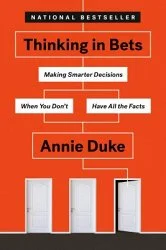Annie Duke
Pete Carroll was a victim of our tendency to equate the quality of a decision with the quality of its outcome.
When I can with executives, I sometimes start with this exercise. I asked group members to come to our first meeting with a brief description of their best and worst decisions of the previous year. I have yet to come across someone who doesn’t identify their best and worst results rather than their best and worst decisions.
Poker is a game of incomplete information. It is a game of decision making under conditions of uncertainty over time. Valuable information remains hidden. There’s also an element of luck in any outcome. You can make the best possible decision at every point and still lose the hand, because you don’t know what new cards will be dealt and revealed. What’s the game is finished and you try to learn from the results, separating the quality of your decisions from the influence of luck is difficult.
If we want proven any game — as well as an in the aspect of our lives — we have to learn from the results of our decisions.
What makes a decision great is not that it has a great outcome. A great decision is the result of a good process, and that process must include an attempt to accurately represent our own state of knowledge. The state of knowledge, in turn, is some variation of “I’m not sure.”
Decision are bets on the future, and they aren’t right or wrong based on whether they turn out well on any particular iteration.
Treating decisions as bets.
